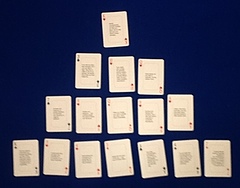THIAGI GAMELETTER:
November 2012
SERIOUSLY FUN ACTIVITIES FOR TRAINERS, FACILITATORS,
PERFORMANCE CONSULTANTS, AND MANAGERS.
TABLE OF CONTENTS
Masthead
Our mission statement, copyright notice, and cast
of characters.
Game Alert
Practical Advice Card
Games
Five decks of cards, eight engaging games, and 15
reasons for playing them.
Card Games
Collaborative
Classification
Classification and communication.
Jolt
Palm Reading
Too close for comfort.
Video Jolt
One, Two, Three, …
Clap!
The most important leadership secret.
International Workshops
Interactive Training Strategies Workshops
Playing (and learning) around the
world.
From Brian's Brain
The Group Work Deck: The Right Attitudes for
Facilitators by Brian Remer
A link to the latest issue of Brian's
newsletter.
Online Survey
Behavioral Interviewing
Share a piece of practical advice.
Check It Out
PsyBlog ( http://www.spring.org.uk/ )
Understand your mind.
Masthead
THIAGI GAMELETTER:
SERIOUSLY FUN ACTIVITIES FOR TRAINERS, FACILITATORS,
PERFORMANCE CONSULTANTS, AND MANAGERS.
Mission
To increase and improve the use of interactive,
experiential strategies to improve human performance in an
effective, efficient, and enjoyable way.
Editorial Roster
 Author and Editor
: Sivasailam (Thiagi) Thiagarajan
Author and Editor
: Sivasailam (Thiagi) Thiagarajan
 Assistant Editor
: Raja Thiagarajan
Assistant Editor
: Raja Thiagarajan
Associate Editors: Jean Reese and Tracy Tagliati
Contributing Editors: Brian Remer
Editorial Advisory Board: Bill Wake, Matthew Richter, Samuel van den Bergh, and <type your name here>
Copyright Info
The materials in this newsletter are copyright 2012 by The
Thiagi Group. However, they may be freely reproduced for
educational/training activities. There is no need to obtain
special permission for such use as long as you do not
reproduce more than 100 copies per year. Please
include the following statement on all reproductions:
Reprinted from THIAGI GAMELETTER. Copyright © 2012
by The Thiagi Group, Inc.
For any other use of the content, please contact us (
thiagi@thiagi.com ) for permission.
Subscription Info
To sign up, or to donate and help us continue this
newsletter, please see the Online
Newsletter page on our website (
http://thiagi.com/pfp.html ).
Feedback Request
Thiagi believes in practicing what he preaches. This is an
interactive newsletter, so interact already! Send us your
feedback, sarcastic remarks, and gratuitous advice through
email to thiagi@thiagi.com . Thanks!
[Table of Contents]
Game Alert
Practical Advice Card
Games
After 14 years of field-testing and continuous improvement,
we have a new card game system ready for use.
The Topics
We have designed Practical Advice
Card decks on these five key corporate
training topics:
- Building Trust
- Coaching for Performance
- Customer Service
- Listening Skills
- Motivation Techniques
We are working on other key training topics. These decks
will be available soon.
The Cards
Each deck contains 52 practical advice cards (plus a couple
of Jokers).
A practical advice card (PAC) presents a useful tip related
to an important corporate strategy. Here are some sample
practical advice tips from the decks that are currently
available:
-
Building Trust: Admit your mistakes
as soon as you become aware of them.
-
Coaching for Performance: At the end
of the coaching session, ask your employee to summarize
the problem, the solution, and the action steps.
-
Customer Service: Actively listen to
the customer's questions and concerns. Repeat back to
establish that you have clearly understood the
situation.
-
Listening Skills: Avoid multitasking.
Don't check your email, send text messages, read a book,
surf the Internet, or watch the TV. Close the book and
turn off all electronic devices.
-
Motivation Techniques: Allow team
members to make maximum use of their strengths and
talents.
The Games
You can read each piece of advice as if it were a tip
for the day. To go beyond passive reading, we have
designed several training games to entice people to discuss,
evaluate, and apply the suggestions from these cards. These
games can be played by different numbers of players (ranging
from 1 to 100), and last for different periods of time (from
10 minutes to 52 weeks).
Here are brief specifications of eight training games
described in detail in the How To Play
manual:
-
Chat. 3 to 50 players, 12 to 30
minutes. Objective: Discuss a piece of
advice from different perspectives.
-
Thirty-Five. 6 to 100 players,
20 to 30 minutes. Objective: Identify the
most useful pieces of advice.
-
Triads. 3 to 102 players, 15 to
30 minutes. Objective: Improve the
positive outcomes (and reduce the negative outcomes) of
implementing a piece of advice.
-
Explain and Decide. 9 to 100
players, 20 to 40 minutes. Objective:
Compare different pieces of advice and select the most
useful one.
-
Suits. 4 to 100 players, 20 to
30 minutes. Objective: Select the best
pieces of advice.
-
Mingle and Market. 12 to 100
players, 20 to 30 minutes. Objective:
Review, compare, and evaluate pieces of practical
advice.
-
Triple Filter. 1 to 100
players, 10 to 15 minutes. Objective:
Select pieces of advice that can be easily implemented in
a variety of situations to produce high impact
outcomes.
-
One a Week. 1 to 100 players,
20 to 30 minutes each day of the week for 52 weeks.
Objective: To enhance the
implementation of each practical piece of advice.
We are designing and field-testing more training games that
use practical advice cards. You can access complete
instructions for these games from our web site.
15 Reasons Why You Should Conduct these Card
Games
-
Solid, valid content. We did not make
up the pieces of advice off the top of our head. Instead,
we reviewed several books and training packages and
selected the most useful pieces of advice on each training
topic. We also talked to subject-matter experts and
practitioners in the field. The pieces of advice are based
on empirical evidence.
-
Variety of topics. The decks of cards
deal with key competencies related to popular corporate
training sessions: building trust, coaching for
performance, customer service, listening skills, and
motivation techniques. We are continuing our needs
analysis and collecting of validated pieces of advice on
additional topics such as presentation skills, giving and
getting feedback, and working globally.
-
Open approach. The pieces of advice
are not limited to a specific book or a proprietary model
that deals with the topic. Instead, these tips leverage
what the players may have learned from a variety of books
they read, training sessions they attended, and
experiences they have accumulated. The games encourage
mutual learning from a diverse group of players.
-
Practical nature. All pieces of
advice involve specific actionable ideas. They are not
abstract theoretical constructs or philosophical
principles.
-
Self-contained ideas. The piece of
advice on each card can be immediately implemented to
produce measurable results. You don't have to master a
comprehensive conceptual framework or a lengthy
step-by-step procedure to achieve the desirable
outcomes.
-
Variety of games. You can play
several different training games that incorporate the same
deck of practical advice cards.
-
Field-tested content and activities.
We have been working on the content on the cards and the
activities in the training games for the past 14 years. We
have tried out and improved all components of this system
in several workshops around the world.
-
Comprehensive processing. The key
activities in the training games require the players to
examine each piece of advice from different angles. The
players discuss, analyze, compare, evaluate, arrange,
select, apply, and modify the pieces of advice. They also
figure out the costs and benefits of implementing the
piece of advice and discover how to reduce the
disadvantages and increase the advantages.
-
Any number can play. The set of
practical advice card games can accommodate different
numbers of players from 1 to 100+. The games can be used
in individual coaching to large group planning
sessions.
-
From rapid to reflective. The time
required for the play of these games ranges from 10
minutes to 52 weeks. You can select the best game to suit
your schedule.
-
Player friendly. All practical advice
card games have been repeatedly play-tested with groups of
players around the world. They have been continuously
revised to improve their relevance, flexibility,
simplicity, efficiency, and intellectual
stimulation.
-
Facilitator friendly. The
facilitators' manual is designed for effective use by the
trainer. Each game is described in a step-by-step fashion
using our structured text approach that clearly specifies
the purpose of the game, number of participants, time
requirements, supplies, room set up, and
preparation.
-
Companion website. We have
established a website with updates and enhancements of the
practical advice card games. This web site contains lists
of recommended books, instructions for new games,
modifications and variations of the existing games, and
tips for facilitators.
-
Same game, different content. Once
you learn how to conduct any of the games with cards that
deal with a specific topic (such as motivation
techniques), you will discover that the same game can be
used with practical advice cards that deal with other
topics. From the player's point of view, they leverage
learning the game to learning from the game.
-
Reinforced by another deck of cards.
Each topic in the practical advice decks has a companion
deck of cards (sold separately) with an entirely different
type of content and with different play activities. You
can use these decks (called Four Suits) to
strengthen the impact of the Practical Advice
Card decks.
[Add your feedback]
[Return to Table of Contents]
Card Games
Collaborative
Classification
This activity requires a team to rate the usefulness of
different pieces of practical advice. It also serves another
purpose: Based on their experience in the activity, the
participants learn how to communicate effectively and to
provide equal opportunity to all team members.
Synopsis
Teams of participants classify 16 practical advice cards
into seven categories related to the usefulness of the
advice. Later, they reflect on the effectiveness of their
joint decisionmaking and plan for better communication. They
implement this plan by sorting another set of 16 cards.
Purpose
To work as a team and sort a set of practical advice cards
into seven categories related to the usefulness of each
piece of advice.
Participants
Minimum: 3
Maximum: Any number, divided into teams of
3 to 7
Best: 10 to 30
Time
40 - 60 minutes
Supplies
- One deck of Practical Advice
Cards for every three teams
- Countdown timer
- Whistle
Flow
1. Get Ready
Organize teams. Divide the participants
into two or more teams of three to seven members each.
Distribute practical advice cards. Deal
16 practical advice cards, one card at a time to each team
member. Some participants may receive one more card than
the others.
Explain the task to the participants.
Working as a team, they should classify the 16 cards into
seven categories related to their usefulness. The cards
must be organized to form a “forced bell curve.”
Specify the details of each category:
-
Extremely useless. Participants
must choose the single card that is the most
useless.
-
Useless. Participants must choose
two cards that are useless.
-
Somewhat useless. Participants must
choose three cards that are slightly useless.
-
Neutral. Participants must choose
four cards that are neither useless nor useful.
-
Somewhat useful. Participants must
choose three cards that are slightly useful.
-
Useful. Participants must choose
two cards that are useful.
-
Most useful. Participants must
choose the single most useful card.
The results should look like this:

2. Classify the cards
Sort the cards. Ask the participants to
set up space for the seven categories. Tell them to take
turns to read one card at a time, discuss it, and place it
on the appropriate category. Encourage the participants to
rearrange the cards as more items are added to the
continuum. Announce a 15-minute time limit for completing
the task.
Conclude the task. At the end of 15
minutes, ask the teams to stop classifying the cards.
Reassure them that it does not matter if the task is not
completed.
3. Conduct the First Debrief
Ask and discuss the following types of questions:
- Are you happy with the way the cards have been
classified into the seven categories? How satisfied are
you with the final results?
- Do you think the team's collaborative decisions are
superior to decisions that you could have made alone?
Why do you think so?
- During the card classification activity, did your
teammates listen to your ideas? Did you have sufficient
opportunity to share your ideas?
- Do you feel that everyone was given equal
opportunity to participate in the classification
process?
- Do you think that some people have more expertise
about the topic? Should they have been given more time
than the others?
- Do you feel that some people have more expertise in
facilitating group activities? Should they have been
given a leadership role?
- Do you feel that some people have communication
difficulties? How could we support these people?
- Could you have performed the card-sorting task more
effectively if you used a systematic procedure? What
steps should this procedure contain?
- People differ in their thinking styles and
communication styles. How did these differences manifest
themselves in your teamwork?
4. Plan for the Next Round
Brief the teams. Inform the teams that
you are going to give them another set of 16 cards. They
have to repeat the process of classifying this new set of
cards into the same seven categories reflecting their
usefulness.
Ask the teams to plan. Based on their
previous experience and on the debriefing discussion, ask
the team members to come up with a suitable procedure.
Explain that their goal is to complete the classification
task efficiently and to give all participants equal
opportunity to share their ideas. Announce a time limit of
5 minutes to plan an appropriate procedure.
5. Classify Another set of Cards
Begin the second round. Distribute 16
cards, one card at a time to each participant as before.
Announce a time limit of 15 minutes and ask the teams to
get started.
6. Conduct the Second Debrief
Conclude the session and discuss the
procedure. At the end of 15 minutes, announce
the end of the task. As before, reassure the teams that it
does not matter if they have not completed the
classification task. Ask and discuss the following types
of questions:
- How satisfied are you with the results of this
round? Are you more satisfied with the second round than
with the first one? Why do you feel that way?
- Are you happier this time about the opportunities
for equal participation?
- Did the planning before the activity help you become
more effective?
- What were the major differences between the
procedures used during this round and the earlier
round?
- Could we make the procedure better? Is there a limit
to how many times we can improve the procedure? Could we
ever achieve an ideal procedure that will satisfy
everyone's needs?
[Add your feedback]
[Return to Table of Contents]
Jolt
Palm Reading
Here's a slightly modified version of Tracy's jolt,
Do You See What I See?, published in
the April
2011 issue of TGL.
This version is inspired by puzzles that display extreme
close-up photographs and require you to guess what the object
is. The jolt explores the concept of getting too close to
something both literally and metaphorically.
Synopsis
Participants make a circle with their right thumb and index
finger. They note what are able to see through this circle
when they are close to an object and away from it.
Purpose
To explore how looking at an object from a distance helps
us see a wider picture.
Training Topics
- Total system
- Observation
- Psychological distance
Participants
One or more, working independently. Best results are
obtained with groups of more than 10.
Time
3 minutes for the activity
3 minutes for
debriefing
Preparation
Rehearse the activity. Follow the
instructions give below to experience what the participants
will be doing and seeing.
Flow
Give initial instructions. Tell them to do
these steps as you demonstrate each of them:
- Extend your left hand with palm open, facing
up.
- Make a circle with your right thumb and index finger.
Place this circle on top of the left open palm.
- Look through the circle and note what you see.
Give additional instructions. Give these
instructions as you demonstrate each step:
- Keep your left hand stretched out.
- Keep looking through the circle that you created with
your right thumb and index finger.
- Move this circle away from your left palm toward your
eyes.
- Make a note of what you can see as you bring the
circle close to your right eye.
Comment on what can be seen through the
circle. Ask the participants to move their
thumb-index finger circle close to the left palm and away
from it. Point out that they are able to see the entire palm
and parts of the left hand as they move away from the palm.
When the circle gets closer to the palm, they are able to
see only a small part.
Debriefing
Explain the key learning point:
When we get too close to an object, we see only parts of
it. Judging from what we see, sometime we many not even be
able to figure out the true nature of the object. When we
move away from the object, we see the entire object in
context. It becomes more meaningful.
Ask the participants for real-world
examples. Encourage them to talk about situations
where getting too close to an object conceals the broader
context.
Discuss metaphorical equivalents. Invite
the participants to talk about how looking at objects,
people, and events from a psychological distance enables us
to see the bigger picture.
Learning Points
- Getting too close to an object prevents us from seeing
the total picture.
- Looking at things from a distance provides us with the
context and additional insights.
[Add your feedback]
[Return to Table of Contents]
Video Jolt
One, Two, Three, …
Clap!
We are producing a series of video jolts and hope to release
them in upcoming issues of TGL.
This issue's jolt lasts for 2 minutes and 22 seconds. Visit
http://bit.ly/PFD7A9 to watch Thiagi demonstrating
one of his favorite jolts.
Watch the video and master the mechanics of the jolt. Modify
the jolt to suit your personal style and use it with your
participants to drive home your learning point.
[Add your feedback]
[Return to Table of Contents]
International Workshops
Interactive Training Strategies Workshops
During the next few months Thiagi will be piling up frequent
flyer miles traveling to different parts of Europe and Asia,
conducting his 3-day interactive training strategies workshop.
Here's an update of our international workshops. For
additional information, brochures, and registration forms,
visit our website
calendar.
2012
Paris, France: November 20-22, 2012
Interactive Strategies for Training
and Education
(Stratégies interactives pour
la formation et l'enseignement).
Organized by Bruno Hourst and his team at Mieux Apprendre.
In English with simultaneous translation.
Paris, France: November 23, 2012
Techniques interactives de formation:
les outils fondamentaux.
Présenté par Thiagi, Bruno Hourst et Patrick
Dorpmund.
Winnipeg, MB, Canada: December 2, 2012
Participants and Presenters: Better
Together. Preconference workshop at
the Canadian Association of Professional Speakers National
Convention 2012.
Vancouver, BC, Canada: December 6-7, 2012
Interactive Strategies for Improving
Performance—All New!.
2013
Singapore: January 10-12, 2013
Interactive Training
Strategies. Organized by Stanis
Benjamin and his team at Centre for Communication and
Sales Training.
Kuala Lumpur, Malaysia: January 21-23, 2013
Interactive Training
Strategies. Organized by Click
Academy Asia.
Winterthur, Switzerland: June 4-6, 2013
Interactive Training Strategies,
Switzerland. Organized by Samuel van
den Bergh and his team at van den Bergh Thiagi
Associates.
Winterthur, Switzerland: June 7-8, 2013
Design Clinic and Advance Interactive
Strategies, Switzerland. Presented
by Thiagi and Samuel van den Bergh. Organized by Samuel
van den Bergh and his team at van den Bergh Thiagi
Associates.
Coming Soon
We are in the final stages of organizing our workshops in
Australia and India.
[Add your feedback]
[Return to Table of Contents]
From Brian's Brain
The Group Work Deck: The Right Attitudes for
Facilitators
by Brian Remer

Greetings!
Successful group facilitation depends as much on attitude as
technique. Plenty of books give a variety of strategies to
keep a group engaged and focused. But resources for honing the
internal attitudes helpful for effective facilitation are not
as common. This issue of the Firefly News Flash
features a deck of cards that will challenge anyone to
consider the best attitudes for balanced, impartial
facilitation. Power Tip: Distribute
facilitation roles among all participants for a harmonious
group.
Read more in the October 2012 issue of Firefly News
Flash: http://www.thefirefly.org/Firefly/html/News%20Flash/2012/October%202012.htm
.
[Add your feedback]
[Return to Table of Contents]
Online Survey
Behavioral Interviewing
Many of my friends conduct training sessions on behavioral
interviewing. You are probably familiar with this technique.
This issue's survey is related to behavioral interviewing.
Open Question
What practical advice do you have for a manager who is
planning to conduct a behavioral interview?

(The survey opens in a new window.)
You may include your name along with your response, or if
you prefer, keep it anonymous.
[Add your feedback]
[Return to Table of Contents]
Check It Out
PsyBlog is a website about scientific research into how the
mind works. It's written, designed, and coded by Jeremy Dean,
who is a researcher at University College London working
towards a PhD. Jeremy translates articles published in
reputable academic journals into readable and practical
prose.
Here are a few recent articles that I found very useful:
There are five free and easy ways to follow website updates
at http://www.spring.org.uk/get-the-latest-from-psyblog
. I use PsyBlog's Twitter feed.
The website archives back issues of the blog since 2004. It
also contains a list of popular articles and a convenient
search engine.
Enjoy!
[Add your feedback]
[Return to Table of Contents]
 Author and Editor
: Sivasailam (Thiagi) Thiagarajan
Author and Editor
: Sivasailam (Thiagi) Thiagarajan Assistant Editor
: Raja Thiagarajan
Assistant Editor
: Raja Thiagarajan

